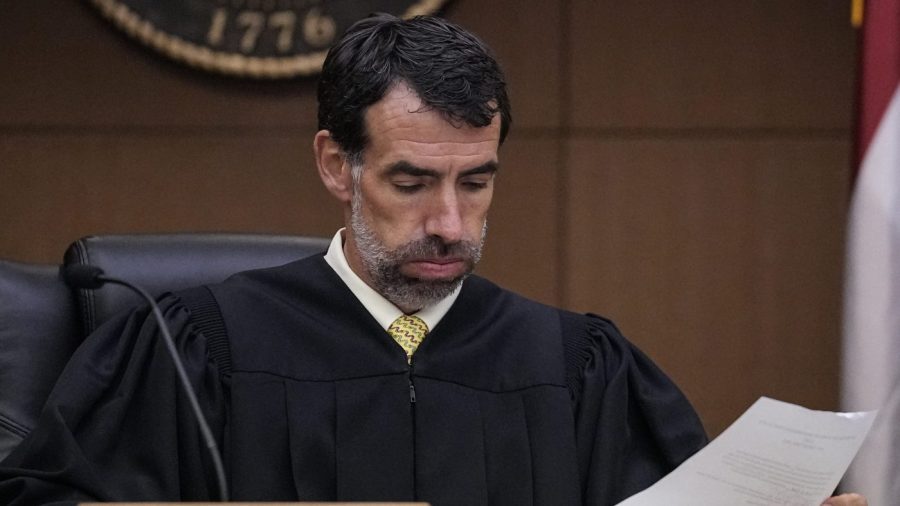A Georgia judge must decide whether to squash new state election rules, including a controversial change requiring hand-counted verification of ballots, in the final weeks before November’s election.
Fulton County Superior Judge Robert McBurney heard arguments Tuesday over six new rules instituted by Georgia’s State Election Board, which lawyers for Cobb County’s election board said could hinder a smooth contest this fall.
The Republican-led state board has come under heightened scrutiny for passing a series of last-minute rule changes that election officials have warned could sow “chaos” at the polls.
“This is not one rogue local election board trying to pick a fight with the State Election Board,” said Michael Caplan, a lawyer for the Cobb County Board of Elections.
“This is a case where the chief legal officer of the state — the chief officer of the state, that comprises different populations, different demographics — all have serious questions regarding how this election is to happen in two weeks.”
The rules are set to go into effect on Oct. 22, just two weeks before the election, and after early voting in the state is underway. The Democratic National Committee intervened in the lawsuit.
One of the rules, which would require a hand count of the number of paper ballots after polls close, has drawn specific concern.
Under the new rule, three poll workers at each facility will be required to count the physical ballots, not votes, “separately” and “independently” in stacks of 50 until all three counts are the same. The count must be completed on election night unless a scanner has more than 750 ballots at the end of voting, at which point the poll manager can choose to start counting the next day.
Election officials have warned that there’s little time to train poll workers on the change, and poll workers say the task is overly burdensome and prone to error. Secretary of State Brad Raffensperger has called the rule “misguided,” saying it would delay the reporting of election results.
Caplan told the judge that, to comply with the board’s changes, 444 Cobb County poll officers must be trained in how to conduct a hand count. The secretary of state’s office is declining to provide training until a court rules on the validity of the change, he said.
The Cobb County election board asked the judge to indefinitely pause enforcement of the rule, additionally claiming several procedural errors by the state board should invalidate it and the other rules.
When questioning a lawyer for the State Election Board, McBurney raised similar concerns.
“You dumped a problem in their lap…a few weeks before it needs to be put into operation,” the judge said. “What’s the wisdom of that? And what’s the necessity for that, as opposed to, ‘All right, let’s make sure that we get to try this out, and this will be effective in the next election.’”
Lawyers for the State Election Board pushed back that the panel was tasked by Georgia’s legislature with defining election rules.
“Nothing in the legislation says anything about any limitation on when those rules can be passed,” said lawyer Robert Thomas.
Thomas also argued that some criticized language in the rule — requiring that poll managers immediately determine the reason for any inconsistencies, correct and document them — was used in two previous elections.
“So, the idea that this is some massive intrusion upon the superintendent’s authority is overblown,” he said.
Another of the rules will give political party poll watchers greater access to the vote counting process, now allowing them access to tabulation areas. Caplan contended that, with increased access, costly security measures must be put in place, too.
McBurney acknowledged the heightened threat environment around elections but chafed at the idea that the State Election Board’s rules would worsen them, suggesting instead that general “polarization” was to blame.
Still, Caplan said the “rushed nature” of the rule changes could undermine voter confidence and increase disinformation and distrust — issues all constituting irreparable harm for the Cobb County election board.
Tuesday’s hearing came on the heels of a separate ruling by McBurney, which established that county election officials may not delay or decline to certify election results, rejecting a challenge from a Fulton County election board member who refused to certify during Georgia’s spring primary.
At least 19 Republican county election officials in Georgia have refused to certify election results since 2020, an increase from previous years, according to The Atlanta Journal-Constitution.
McBurney is also weighing the validity of two other new State Election Board rules, which would allow for a “reasonable inquiry” to be conducted before election certification and gives election workers the ability “to examine all election related documentation created during the conduct of elections.”
As it was in 2020, Georgia is a critical battleground state in this election and could determine who wins the White House. Despite winning the state in 2016, former President Trump lost Georgia by just 11,779 votes to President Biden in 2020.
Vice President Harris is polling 1.1 percentage points behind Trump in the state, according to The Hill/Decision Desk HQ’s latest aggregation.
McBurney is expected to issue a ruling on the matter in coming weeks.
“Things are happening quickly,” McBurney said at the end of Tuesday’s hearing. “The State Election Board has been working hard to move forward in the ways it thinks is the right way to make elections fair, legal and orderly. Some of the steps they’ve taken — the majority has taken — other folks disagree with, and lawsuits have followed.
“We’re here because we work things out in courts and not with coups and other things like that,” he said.
The post Judge mulls new Georgia election rules, including ballot hand-count appeared first on World Online.

